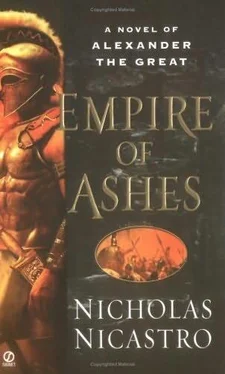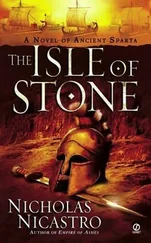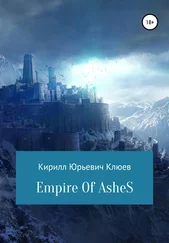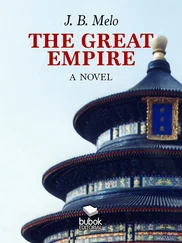Nicholas Nicastro - Empire of Ashes - A Novel of Alexander the Great
Здесь есть возможность читать онлайн «Nicholas Nicastro - Empire of Ashes - A Novel of Alexander the Great» весь текст электронной книги совершенно бесплатно (целиком полную версию без сокращений). В некоторых случаях можно слушать аудио, скачать через торрент в формате fb2 и присутствует краткое содержание. Жанр: Исторические приключения, на английском языке. Описание произведения, (предисловие) а так же отзывы посетителей доступны на портале библиотеки ЛибКат.
- Название:Empire of Ashes: A Novel of Alexander the Great
- Автор:
- Жанр:
- Год:неизвестен
- ISBN:нет данных
- Рейтинг книги:4 / 5. Голосов: 1
-
Избранное:Добавить в избранное
- Отзывы:
-
Ваша оценка:
- 80
- 1
- 2
- 3
- 4
- 5
Empire of Ashes: A Novel of Alexander the Great: краткое содержание, описание и аннотация
Предлагаем к чтению аннотацию, описание, краткое содержание или предисловие (зависит от того, что написал сам автор книги «Empire of Ashes: A Novel of Alexander the Great»). Если вы не нашли необходимую информацию о книге — напишите в комментариях, мы постараемся отыскать её.
Empire of Ashes: A Novel of Alexander the Great — читать онлайн бесплатно полную книгу (весь текст) целиком
Ниже представлен текст книги, разбитый по страницам. Система сохранения места последней прочитанной страницы, позволяет с удобством читать онлайн бесплатно книгу «Empire of Ashes: A Novel of Alexander the Great», без необходимости каждый раз заново искать на чём Вы остановились. Поставьте закладку, и сможете в любой момент перейти на страницу, на которой закончили чтение.
Интервал:
Закладка:
Now you will recall that when Aeschines told you of Gaugamela, I could not hold my peace at his lies. Of course, Aeschines was not there, so he may not know to what degree the story of this battle has been distorted. My rudeness was wrong, and I apologize for it. But be assured of these facts: the fighting at this battle was real, and it was terrible, and there are Macedonians walking around to this day who lose sleep over the horror of it.
Taking the initiative, Arridaeus directed the Macedonian line forward. This, he knew, was exactly what Darius hoped, that he would charge straight ahead and allow himself to be flanked on both sides. But this was only a bit of misdirection. At the opportune moment, he had the archers on his right wing spin on their heels and push south, making a dash for an area beyond where the Persians had leveled the ground for their chariots. His plan was to make the enemy extend his lines in an undisciplined manner, so that gaps would appear for Alexander to punch through.
It didn’t work. Instead, the Bactrian cavalry on Darius’s left covered the enemy in good order. On the contrary, the rightward extension of the Macedonian line caused a wide gap to form between the archers and the Hypaspists. Darius’s Massagetan cavalry was through the hole in an instant, rampaging in the Macedonian rear. It was fortunate for us that they did not get through in enough numbers to end the battle right there. Instead, the back ranks of the Foot Companions did an about-face and presented their pikes, forcing the Massagetans to find easier prey among the baggage animals and camp followers.
Darius sent out his scythed chariots to soften up the enemy front. Contrary to what Aeschines has said, these terrible things could not be defeated by just stepping aside as they passed. The phalangites tried to do this, but the Persians had changed their tactics: instead of coming on in scattered fashion, the chariots formed a flying wedge too wide to avoid. The chariots were met by a storm of missiles, but most of them got through.
That was when the Macedonians suffered a further surprise: the Persians had modified the axles so the drivers could trigger a spring that extended the iron blades sideward. Hundreds of men were cut down at mid-body. Though I was some distance from all this, for the rest of my days I will remember the screams of the Macedonians. Later, just after the battle, I saw the place where the scythed chariots had rolled through: for a distance of hundreds of yards, there was nothing but lopped extremities and their dying remainders. So suddenly were these men killed that some of their severed legs were left upright in the mud, still standing in the straight rows of the phalanx.
What stopped the chariots at last was the simple accumulation of dead bodies. The torrents of blood pouring on the ground destroyed the footing of the horses, while piles of armored corpses slowed the vehicles down. In time the Macedonian javelins and arrows did their work, and the last chariot was brought down. But never let it be said that this was easy work!
As all this went on, small groups of Persians and even individuals were showing their courage by running out onto the field, challenging the Macedonians. More often than not, if a phalangite or hypaspist was foolish enough to meet them, the Persians won these duels. Yet each of these private victories was really a defeat, for when these impetuous Persians rushed out they opened gaps in their lines. Here, as at Marathon, Plataea, Issus and a hundred other battles, the Persians failed to understand the most important principle of modern war: to stay together, to keep the line, even at the cost of appearing cowardly.
Arridaeus was never fazed by minor reverses. Since I had trespassed on his hiding place, it seemed that further precautions were taken against discovery of his secret. Unlike the rest of the Macedonians, who wore Phrygian or Boeotian helmets that left the face exposed, Arridaeus’s head was encased in an old-style Corinthian helmet, with a visor. The horsehair mane of his helmet had also been stripped off, to make him less conspicuous. Finally, the system of signals he used to command the troops was altered: instead of sending riders to communicate with the trumpeters, which risked attracting attention, the trumpeters were stationed right next to Arridaeus.
The time came when the idiot’s unerring eye detected a significant weakness in the Persian line. The order was given, the trumpets sounded, and Alexander rode out at the apex of a cavalry wedge. He was, this time, dressed not in Achilles’ panoply but the standard gold-fringed cape of Macedonian royalty, with a mailed corselet underneath that he had stripped from the corpse of a Persian noble at Issus. But whatever he wore, we all would have recognized that distinctive half-crouch in which he rode, his shoulders squared to the enemy, spear cocked far forward.
Arridaeus was right again: the light infantry in the King’s path was too thin to stop him. Some among the enemy were riden down; the others fled, opening up a gap in the enemy front. The gap was shallow, with thousands upon thousands of reserves drawn up beyond it. Yet, unaccountably, the Persian allies did not come up to plug the hole. Instead, they stayed rooted in their spots. They wouldn’t fight.
More than anything Darius failed to do, it was this hesitation that lost the battle for the Persians. Fearless and terrible, Alexander tore through rank after rank of mostly unarmored troops, burying himself in the midst of the enemy. His voice, guttural and strange, could be heard back in among the hypaspists:
“Kill me! Who among you will kill me?”
True to their pattern, the Asians wanted nothing to do with this mad, lethal apparition. Men ran from him in any direction they could, disrupting the entire Persian left wing. When Alexander made his turn to make for Darius, half the Great King’s army had lapsed into frenzied, disorganized retreat.
There was heroism on the other end of the Macedonian line, too. The Parthian and Medan cavalry were bearing down hard on Parmenion. Outnumbered, his line began to crumble under the pressure. By his sheer determination, Parmenion willed his men to stand their ground, digging their pikes into the earth as the Thessalian horsemen charged to their rescue. It was a superb defense against overwhelming odds, and the old man accomplished it without Alexander’s help. By that, I mean there was no headlong dash by the king’s Companions to save Parmenion’s skin. Anyone who had been there would know this is a fable-that front was miles long, strewn with obstacles like the wreckage of destroyed chariots and bodies and rampaging elephants! No, Alexander’s rhapsodes cannot have it both ways, cannot make him the hero of the right wing and the left. If you leave this trial knowing anything for certain, it must be this: Parmenion earned the victory at Gaugamela every bit as much as Alexander did.
The King’s only object was a final showdown with Darius. He found him waiting in the center, standing tall and defiant in his chariot. Having long since lost his thrusting spear, Alexander held his sword aloft, making straight for the Great King. Darius was ready for him, his throwing arm cocked with a javelin.
“Wait for me, brother!” shouted Alexander, tears in his eyes.
“Come to me dear boy!” answered hooded Darius.
But before they could clash for the last time, the Great King’s charioteer turned his horses around and fled. This was not at Darius’s order. On the contrary, Darius could very clearly be heard protesting, thrashing his driver with his flail. I don’t know if Darius had taken haoma that day, but it seems the charioteer had. All the witnesses told of the devastated expressions on the faces of both kings as the distance increased between them. Although they perhaps had different reasons, each was disappointed at having been cheated of their final embrace.
Читать дальшеИнтервал:
Закладка:
Похожие книги на «Empire of Ashes: A Novel of Alexander the Great»
Представляем Вашему вниманию похожие книги на «Empire of Ashes: A Novel of Alexander the Great» списком для выбора. Мы отобрали схожую по названию и смыслу литературу в надежде предоставить читателям больше вариантов отыскать новые, интересные, ещё непрочитанные произведения.
Обсуждение, отзывы о книге «Empire of Ashes: A Novel of Alexander the Great» и просто собственные мнения читателей. Оставьте ваши комментарии, напишите, что Вы думаете о произведении, его смысле или главных героях. Укажите что конкретно понравилось, а что нет, и почему Вы так считаете.












